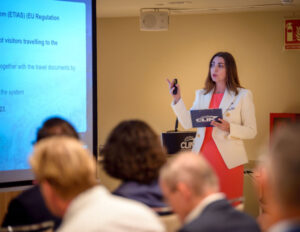Participants debate industry pursuit of net-zero cruising, development of new cruise destinations, and impact of new EU border requirements on the passenger journey
Cruise Lines International Association (CLIA) hosted “Ports and Destinations Dialogue” in Malaga, Spain on 12-13 September bringing together the cruise community to discuss industry trends, challenges and opportunities.
During the Dialogue, CLIA hosted a business session on the evolution and future transformation of the passenger journey at port terminals.
The pandemic has had a major impact on port infrastructure, impacting space for passenger controls as well as the passenger experience. The session discussed the new rules on the horizon for 2023 when the EU will implement new border requirements for third country nationals that will impact passenger flows at port terminals.
The session was chaired by Maria Deligianni, National Director, Eastern Mediterranean, CLIA who commented, “The EU Entry-Exit System will have a major impact on cruise operations and itinerary planning especially in the Eastern Mediterranean where Greece borders non-EU and non-Schengen countries. We call upon governments in the region to coordinate efforts with cruise lines and ports to prepare adequately for the implementation of the new EU border rules.”
The new rules are derived from EU regulations on the Entry-Exit System (EES) and the European Travel Information and Authorisation System (ETIAS) that will be in operation by May and November 2023 respectively. It was evident from the discussion that meeting these deadlines will be challenging whilst cooperation among cruise lines, port authorities and governments is key for the implementation of the systems.
Panellists included Nicola Cesaro, Director of Operations MSC Cruises, Dimitris Iatrides , Executive Director of the Hellenic Ports Association (ELIME), Mai Elmar, Executive Director of the Port of Rotterdam Cruises and Benoit Verbaere, Director of Business Development at SITA.
The CLIA Dialogue also discussed the industry’s pursuit of net-zero carbon cruising by 2050, including the deployment of shore-side electricity for cruise at ports, as well as the development of new cruise destinations.
 Addressing delegates, CLIA Director General in Europe Marie-Caroline Laurent said, “We are exploring many paths to achieve our ambition of net-zero carbon cruising. Now is the time to match dialogue with action and agree the practical steps that we need to take together across our sector. Our success is dependent upon our ability to bring local communities with us on this journey. Our cruise lines members are investing in destinations, and it is important that we work with local partners to manage tourism in ways that protect the economic and social opportunities that cruising brings.”
Addressing delegates, CLIA Director General in Europe Marie-Caroline Laurent said, “We are exploring many paths to achieve our ambition of net-zero carbon cruising. Now is the time to match dialogue with action and agree the practical steps that we need to take together across our sector. Our success is dependent upon our ability to bring local communities with us on this journey. Our cruise lines members are investing in destinations, and it is important that we work with local partners to manage tourism in ways that protect the economic and social opportunities that cruising brings.”
As cruise lines continue to advance their sustainability initiatives, more international travellers say they have a more positive view of the industry’s leadership. According to CLIA data, the percentage of travelers who say the cruise industry is a leader in responsible travel reached 51%, a 9% increase over the past year.
Resurgent consumer appetite to cruise
 CLIA’s new sentiment data also shows a resurgent appetite for cruise, with associated economic benefits for cruise destinations. According to the latest survey data, intent to book a cruise now exceeds levels from three years ago: of the cruise travelers surveyed this summer, 84% said they intend to cruise again, which represents a 5% increase from 2019.
CLIA’s new sentiment data also shows a resurgent appetite for cruise, with associated economic benefits for cruise destinations. According to the latest survey data, intent to book a cruise now exceeds levels from three years ago: of the cruise travelers surveyed this summer, 84% said they intend to cruise again, which represents a 5% increase from 2019.
- According to FRONTEX, in 2019, over 115 million Third Country Nationals (TCNs) travelled to the European Union. By 2025, the number of TCNs is expected to rise to 176 million. In response to this, the EU decided to establish a new system for registering information on the entry, exit and refusal of entry of TCNs crossing the external borders of the MS.
- The EES will involve an automated IT system for registering travellers from third-countries, both short-stay visa holders and visa exempt travellers, each time they cross an EU external border. The system will register the person’s name, type of the travel document, biometric data (fingerprints & captured facial images) and the date and place of entry and exit. It will also record refusals of entry. The EES will replace the current system of manual stamping of passports.
- ETIAS will be an automated IT system for visa-exempt visitors travelling to the Schengen States requiring travelers to obtain a travel authorization, which will need to be checked by carriers before travelling to Schengen countries. Both systems will be developed and monitored by euLISAThe European Agency for the operational management of large-scale IT systems in the areas of freedom, security, and justice.
About Cruise Lines International Association (CLIA)
CLIA is the world’s largest cruise industry trade association and the leading authority of the global cruise community. On behalf of its members, affiliates and partners, the organization supports policies and practices that foster a secure, healthy, and sustainable cruise ship environment, promoting positive travel experiences for the more than 30 million passengers who have cruised annually. The CLIA community includes the world’s most prestigious ocean, river, and specialty cruise lines; a highly trained and certified travel agent community; and a widespread network of stakeholders, including ports & destinations, ship development, suppliers, and business services. CLIA represents 95% of the world’s ocean-going cruise capacity, as well as 54,000 travel agents, and 15,000 of the largest travel agencies in the world. The travel agent and agency members represent the largest network of travel professionals specializing in cruise travel. The organization’s global headquarters are in Washington, DC, with regional offices located in North and South America, Europe, Asia, and Australasia.
The post CLIA hosts “Ports and Destinations Dialogue” in Malaga appeared first on Travelling News.
from Travelling News https://ift.tt/Lko57AJ
via IFTTT
No comments:
Post a Comment